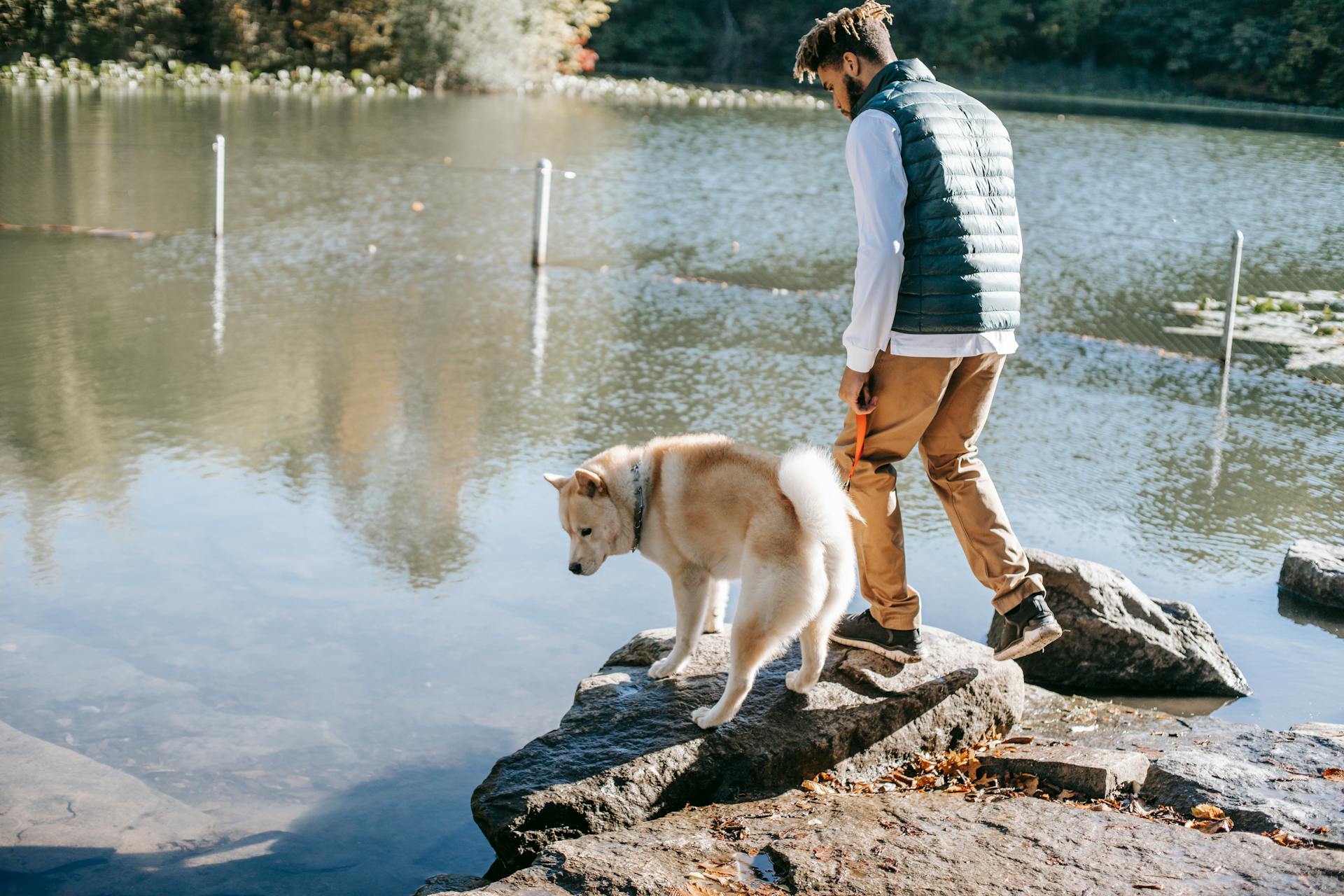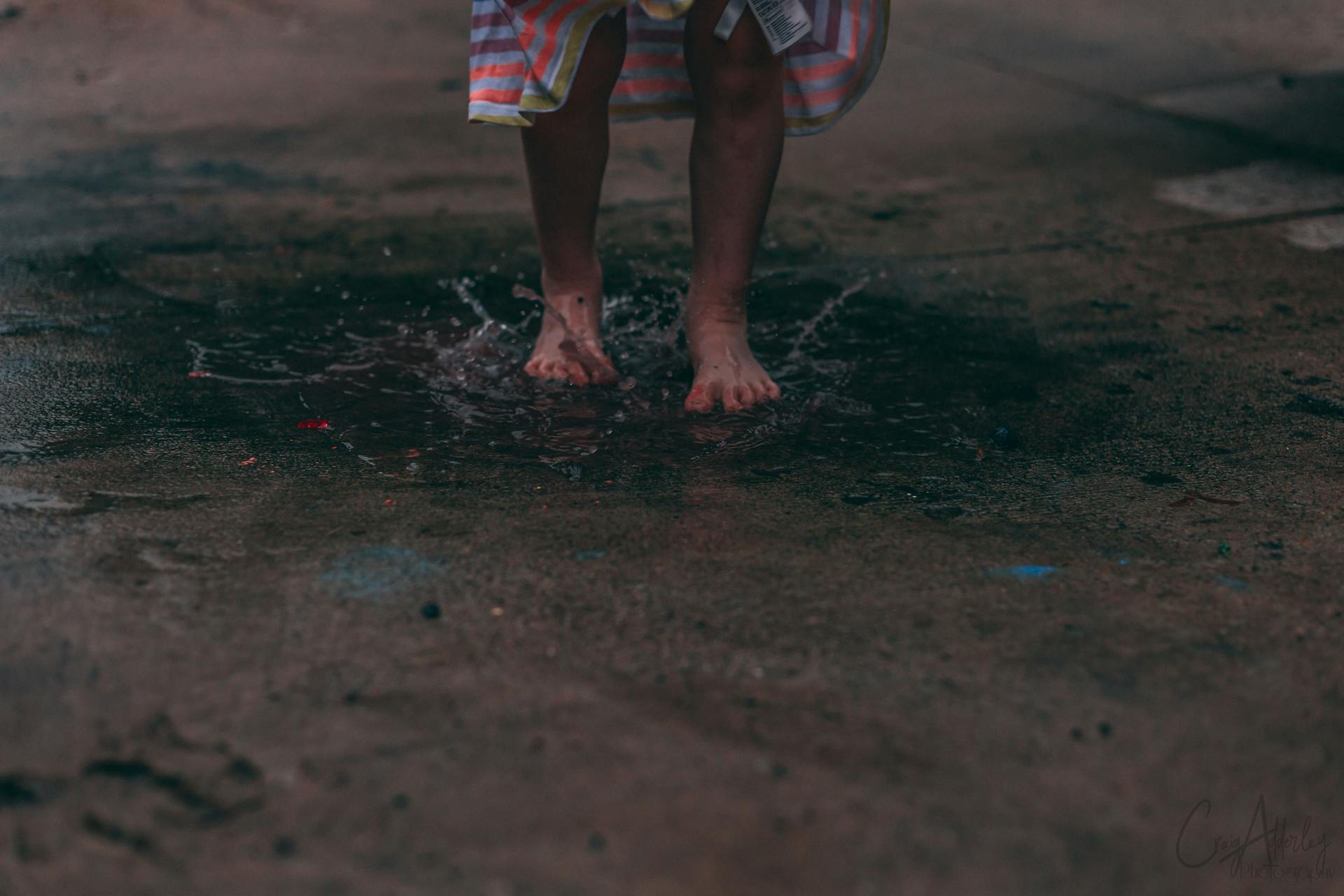
Dog peeing on person can be a frustrating and embarrassing problem, but it's often a sign of an underlying health or behavioral issue. The most common cause of dog peeing on people is medical problems such as urinary tract infections, kidney stones, or prostate issues.
Some dogs may pee on people due to anxiety or stress, which can be triggered by loud noises, new environments, or even separation anxiety. This behavior is often accompanied by other signs of anxiety such as panting, pacing, or whining.
In some cases, dog peeing on people can be a learned behavior, where the dog associates peeing on people with attention or affection. This can be seen in dogs that pee on people and then receive attention or praise from their owners.
If you're experiencing this issue with your dog, it's essential to consult with a veterinarian to rule out any underlying medical issues.
Understanding Dog Urination
Dogs urinate on people for a variety of reasons, and understanding the underlying causes is crucial to addressing the behavior. Submissive urination is a common issue that can be triggered by greetings, which are highly emotional times for dogs.
Some dogs may exhibit appeasing postures, such as turning their body into a U shape, during greetings, and may also urinate. This is often referred to as “submissive urination”. Submissive urination is most common in very young, socially inexperienced dogs.
To prevent or address submissive urination, it's essential to manage the greeting. This can be done by having people approach your dog calmly and quietly, using a calm, neutral voice when talking to your dog. You can also try having your dog meet new people and dogs outside in case of an accident.
Modifying how you interact with your dog can also help. This includes avoiding direct eye contact, approaching your dog from the side, and crouching down to your dog's level. When petting your dog, go for under the chin rather than reaching over the top of the head.
Here are some non-threatening postures to try:
- Avoid direct eye contact
- Approach your dog from the side
- Crouch down to your dog's level
- Pet your dog under the chin
- Keep greetings calm
By following these tips and managing greetings, you can help reduce the likelihood of submissive urination and create a more positive experience for both you and your dog.
Health Problem
Urinary tract infections, bladder stones, and cystitis can all cause your dog to pee inappropriately. These health issues can be painful for your dog, so it's essential to take them seriously.
Kidney disease and diabetes can also lead to excessive urination in dogs. If you suspect either of these conditions, consult with your veterinarian as soon as possible.
Nerve damage and spinal cord injuries can cause your dog to lose bladder control, resulting in incontinence. This is a serious condition that requires veterinary attention.
Intact male dogs will often mark their territory by lifting their leg and intentionally urinating on things. Neutering can help reduce or eliminate this behavior.
Some dogs may experience incontinence due to congenital or acquired conditions. If you notice your dog leaking urine or peeing without being aware of it, consult with your veterinarian to rule out any underlying medical problems.
Prevention and Cleaning
Dogs are often attracted to previously soiled spots, so it's essential to eliminate as much of the odor as possible. Use a commercially available product that contains enzymes to degrade the urine or feces, such as Urine Away.
To prevent accidents, it's crucial to identify the triggers that cause your dog to pee on you. Dogs are often drawn to certain scents or textures.
Cleaning Urine or Fecal Deposits
Cleaning urine or fecal deposits can be a real challenge, especially if your furry friend has an accident in the house.
Dogs are often attracted to previously soiled spots, so it's essential to eliminate as much of the odor as possible.
Use a commercially available product that contains enzymes to degrade the urine or feces, such as Urine Away.
Controlling Outdoor Markings
Controlling Outdoor Markings is key to preventing unwanted urine marks in your yard or neighbor's yard. Supervise your dog closely when outside, especially in areas where marking would not be acceptable, such as on a patio or in your neighbor's yard.
Dogs are particularly likely to leave their urine messages in places where other dogs have urinated, and when entering a new environment. Hold your dog on a leash except when interacting directly with him.
You can learn to predict and pre-empt urine marking in locations such as your neighbor's favorite flower bed. Encourage your dog to move along with you by using a happy voice and even a food lure until you reach a safe location.
Direct supervision and prevention are the keys to controlling outdoor markings. Keep your dog on a leash when visiting new places, at least until they are comfortable, settled, and have had the opportunity for supervised exploration of the new environment.
For another approach, see: Why Do Male Dogs Lift Their Legs to Urinate

Supervise closely and be prepared to call your dog to you quickly if you notice signs such as prolonged sniffing in a specific location. Use a belly band to protect the environment, but remember to supervise and distract your dog at the first sign of interest in a potential trigger for marking.
Seeking Help and Solutions
If your dog continues peeing on you when excited or submissive, it's time to seek professional help. A credentialed animal behaviorist can provide a custom behavior modification plan to address the issue.
Sometimes, getting a fresh perspective from a specialist can make all the difference. They may be able to identify patterns in your puppy's behaviors that you're missing.
Infections, diseases, and congenital disorders of the urinary system in dogs can also cause peeing on people. These conditions can be serious, so it's essential to rule them out with a veterinarian's help.
You can find credible sources of information on these topics, such as the Merck Veterinary Manual and the UC Davis, Clinical Animal Behavior Service.
A list of potential causes of dog peeing on people is not provided in this section, as the relevant article section facts do not include such information.
You might like: Why Does My Dog Not like a Certain Person
Neutering and Training
Neutering may reduce the tendency to mark in some dogs, but it's not a guaranteed cure.
Studies have reported that neutering can reduce marking behavior by up to 80% in male dogs.
Your veterinarian can help you determine whether surgery is appropriate for your dog.
Stopping Urination
Before trying to address urination issues, it's essential to take your dog to the veterinarian to rule out any health problems. A urinalysis will test your dog's urine for common problems including infection.
To treat submissive peeing, do not hit, scold, or yell at your dog after they have peed. Instead, attempt to build your dog's confidence by teaching basic cues like sit, stay, and come.
Avoid direct eye contact, approach your dog from the side, and crouch down to your dog's level when interacting with them. This non-threatening posture can help reduce stress and anxiety.
When petting your dog, go for under the chin rather than reaching over the top of the head. This gentle approach can help your dog feel more comfortable and secure.
For more insights, see: Why Is My Dog's Pee Greasy?
If your dog pees in the house, simply clean it up without making a fuss or yelling. This will help prevent accidents and make cleanup easier.
Here's a quick rundown of tips to help you interact with your dog in a non-threatening way:
- Avoid direct eye contact, approach your dog from the side, and crouch down to your dog's level.
- When petting your dog, go for under the chin rather than reaching over the top of the head.
- Keep all greetings calm and take your dog outside to pee as soon as you get home.
- Remind guests to follow the same approach when they greet your dog.
What About Neutering?
Neutering may reduce the tendency to mark in some dogs, but it's not a guaranteed cure. Marking occurs in dogs that are sexually intact, neutered, or spayed.
Studies have reported that neutering can reduce marking behavior by up to 80% in male dogs. Neutering can cause both physical and behavioral changes.
Your veterinarian can help you determine whether surgery is appropriate for your dog.
Dogs: Submissive and Excitement-Based Peeing
Dogs will sometimes pee when they're in an exciting or overwhelming situation, and it's not the same as dogs who have urinary accidents in the house.
Submissive urination occurs during greetings, where dogs may turn their body into a U shape, lower their body, lift their lips, and/or pull their ears back. They may also urinate.
Excitement-related urination happens when dogs are very excited about meeting people, and they may leap into the air or spin in circles, leading to urination.
Neither submissive nor excitement-related urination is done deliberately, and the dog has little or no conscious control of the behavior.
Submissive and excitement-related urination are most common in very young, socially inexperienced dogs.
To prevent this behavior, manage the greeting by having people be calm and quiet when greeting your dog, using a calm, neutral voice when talking to your dog.
Boisterous greetings and outstretched arms can be overwhelming and trigger emotional conflict or fear.
Limiting contact to short, one-handed pets and having people give your dog treats can help calm them down.
Instead of letting your dog immediately approach a person, stand quietly a few steps away for a few minutes, give your dog treats, then give the new person a treat and let your dog approach them for some treats.
If your dog knows how to sit, the person can ask for a sit, but only if your dog is calm and focused on the food.
Here's an interesting read: Dog Treats for Big Dogs
After a few repetitions, your dog will begin to approach people and sit quietly, waiting for a treat.
When guests arrive, invite them to come in and sit in their chairs for a few minutes while you keep your dog on leash at the other side of the room.
Feed your dog treats and help her settle, then release her to visit the guest when she's calm.
Related reading: What to Feed Dogs without Dog Food
Sources
- https://www.thesprucepets.com/fixing-submissive-excitement-urination-1118271
- https://vcahospitals.com/know-your-pet/dog-behavior-problems-house-soiling
- https://www.mccanndogs.com/blogs/articles/dont-pee-on-that-how-to-stop-dog-marking-behaviours
- https://www.vetstreet.com/pet-care/training/is-your-adult-dog-suddenly-having-accidents-in-the-house-heres-what-may-be-going-on
- https://vcahospitals.com/know-your-pet/dog-behavior-problems-marking-behavior
Featured Images: pexels.com


